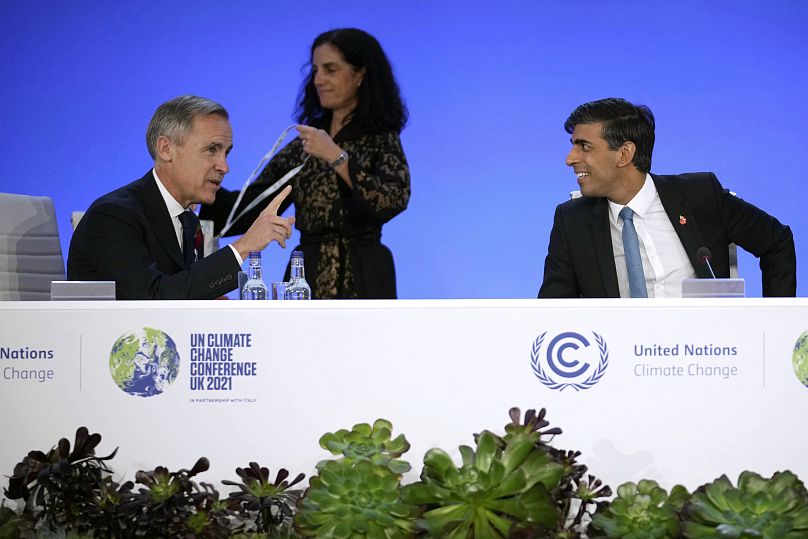On finance day at COP27, Global Witness reveals that one of COP26’s biggest financial commitments is being dangerously undermined.
Financial firms that pledged to reach net zero are still investing $8.5 billion (€8.47 billion) in companies linked to deforestation, new research reveals.
 ADVERTISEMENT
ADVERTISEMENT
 ADVERTISEMENT
ADVERTISEMENT
At last year’s climate summit in Glasgow, there was much fanfare surrounding GFANZ (the Glasgow Financial Alliance for Net Zero). Founded a few months prior, it committed hundreds of financial institutions to become carbon neutral by 2050.
But on finance day at COP27, Global Witness exposed the poor progress of asset firms which have failed to stop investing in forest-felling commodities.
“A year on from COP26, GFANZ membership is at risk of becoming little more than a badge to be worn by banks and financiers, who continue to plough money into practices that are destroying our forests,” says Veronica Oakeshott, forests campaign leader at the NGO.
COP27 is clamping down on empty net zero pledges
The revelation comes amid a high level crackdown on hollow net zero pledges.
UN Secretary-General Antonio Guterres presided over the launch of a UN ‘how to guide’ to root out greenwashing in emissions promises yesterday, with fierce words for “fossil fuel companies and their financial enablers.”
“[He] has quite rightly lost patience with greenwashing companies that sign up to net zero but carry on with the same destructive practices as before,” Oakeshott adds.
“Our research shows this is not only a problem with regard to fossil fuel investments but also exposure to deforestation risk. It is not surprising that Mr Guterres, and his group of advisers, are increasingly looking to legislation to hold companies to account.”
GFANZ dropped out of the ‘Race to Net Zero’
The alliance created a buzz at COP26, led by former Bank of England governor Mark Carney who claimed it could “unlock the $1 trillion of additional annual investment needed for the net zero transition in emerging markets and developing countries by the middle of this decade.”
But climate campaigners were quick to express their scepticism. Greta Thunberg was among those denouncing GFANZ as ‘greenwash’, as it allowed institutions to keep investing in fossil fuels while buying carbon offsets.
In its defence, GFANZ said it would form its plans using "the most rigorous science-based scenarios".
However, in September Carney had to write to members urging them to stop financing deforestation, warning, “the world will not reach net zero by 2050 unless we halt and reverse deforestation within a decade”.
And in October the alliance announced it was dropping out of the ‘Race to Net Zero’ after the UN-backed campaign upped its standards and threatened to kick out non-performers.
"The recent decision by GFANZ to walk away from Race to Zero and its independently-set targets, including ambitious pledges on deforestation, right at the moment that members might be chucked out for not meeting them, tells you everything you need to know about member intentions,” says Oakeshott.
Which financial institutions are still tied to deforestation?
Since COP26, there has only been a three per cent reduction by GFANZ members in investments at risk of contributing to the clearing of the world's climate-critical forests, the analysis shows.
360 asset managers participating in the alliance continue to hold such investments worth a combined $8.5 billion (€8.47 bn) - almost matching the $9 billion (€8.97 bn) sum President Biden pledged to fight deforestation last year.
Financial giants BlackRock, Vanguard and Deutsche Bank are among those continuing business as usual, says Global Witness. They have continued to invest in agri-business companies that stand accused of mass-scale deforestation such as the Brazilian meatpacker JBS.
In fact, Global Witness finds some members have acquired an additional 10 million shares in JBS since COP26, with Vanguard alone increasing investments in JBS by an estimated €12.4 million.
Tougher laws are needed to hold investors to account
Not all in the financial sector are shirking their responsibility.
On Tuesday, nine financial institutions, managing a combined €175 billion in assets, wrote to the European Commission and Council, asking for the financial sector to be included in the EU’s anti-deforestation law.
Triodos Bank, ASN Bank and Merkur were among the signatories acknowledging that “despite voluntary commitments and policies to tackle deforestation, financial institutions are continuing to provide investments linked to deforestation practices.”
They are trying to bring the Commission round to the Parliament’s position - that the final text for the new Deforestation Regulation to ensure EU products aren’t denuding forests should cover financial institutions too.
Global Witness is also calling on governments in key financial centres to introduce legislation requiring investors to ensure their portfolios are not contributing to rainforest destruction.
“If we want any forests left standing, and to have any prospect of avoiding catastrophic climate change, governments must introduce legislation that stops investors contributing to the destruction of rainforests,” adds Oakeshott.












